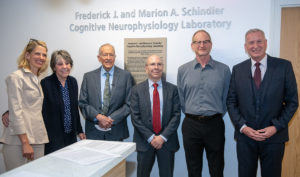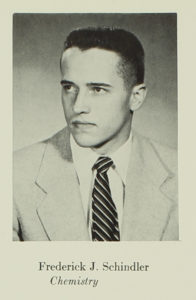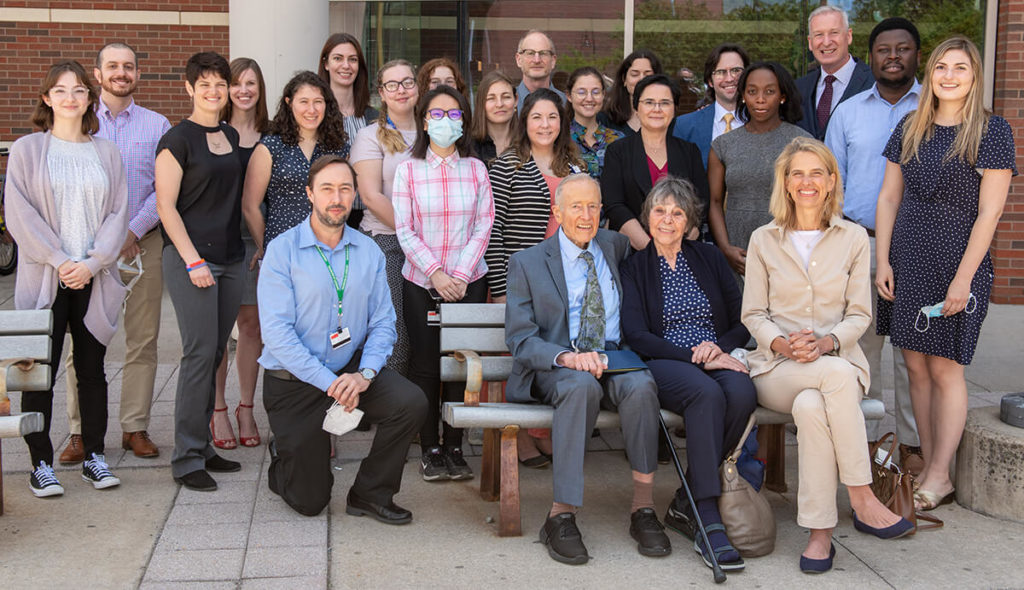Why I Give: Frederick J. Schindler ’57
Why I Give: Frederick J. Schindler ’57
An alumnus and longtime donor, Fred Schindler reflects on the gift he and his wife made to establish the Frederick J. and Marion A. Schindler Cognitive Neurophysiology Lab, supporting research on autism and development disabilities.

From left: Sophie Glover, Marion A. Schindler, Frederick J. Schindler ’57, Mark Taubman, MD, Ed Freedman, PhD, John Foxe, PhD. View a video of the lab dedication and interview.
Frederick J. Schindler ’57 graduated from the University of Rochester with a bachelor’s degree in chemistry. He went on to earn a PhD in biophysics from the University of Pennsylvania and spent 40 years working in chemical product research and development before launching a second career as a science teacher at Hill Top Preparatory School in Bryn Mawr, Pennsylvania. The school is known for providing life-changing learning experiences for bright students with performance-based learning differences. Through teaching, Schindler met his wife Marion, an educator and former English department chair at another Philadelphia-area school.
Now fully in retirement, Schindler has pursued a self-study of scientific literature related to behavior and mental health, with an emphasis on “brain training” interventions for attention deficit disorders, autism, and age-related dementia. Following a discussion with John J. Foxe, PhD, and Edward G. Freedman, PhD, of the Del Monte Institute for Neuroscience in 2019, Schindler made a gift that funded two proof of concept research projects: “Adding Autism and High-Density Electrophysiology to the Adolescent Brain Cognitive Development (ABCD) Study,” to further develop these novel and strategic areas of the overall study at Del Monte.
The University of Rochester Medical Center and the Del Monte Institute for Neuroscience were proud to name the Frederick J. and Marion A. Schindler Cognitive Neurophysiology Laboratory in May 2022, in grateful recognition of the Schindlers’ generosity and their passion to support research that will enable neuroscience-based interventions for autism.
Why name the Cognitive Neurophysiology Lab?
Marion and I are very encouraged by the research that is being done here and by the leadership and scientists who are doing that work. It goes beyond the Department of Neuroscience, making connections across the University of Rochester as a whole. So that’s very rewarding to see. Previously, we established a Charitable Remainder Unitrust (CRUT) for the benefit of the Warner School of Education, and we are now adding to it with our gift to the Del Monte Institute for Neuroscience. This CRUT is professionally managed and diversified and provides us with a steady income stream for the rest of our lives. From a financial planning point of view, it’s been an excellent way to give. And I think that’s a win-win for everybody.
I’m very appreciative to the University staff for listening to my interests and helping me align them with my giving. Once I heard about The Adolescent Brain Cognitive Development (ABCD) Study, it was very natural to support the project.
In addition to the CRUT, we also made a cash gift for the University’s immediate use, and we’re hearing some of the results of that project already.

Frederick J. Schindler ’57, Interpres student yearbook
When you reflect on your time at the University of Rochester, are there distinct aspects of your education that you have brought forward into your career?
During my senior year in high school, I thought I was a real hotshot in my local community. I was getting good grades and all. Then I participated in the Westinghouse Science Talent Search and realized how little I knew. It was an epiphany that set me on the path of lifelong learning. I received a scholarship to attend the University of Rochester, and for those four years I learned all I could about chemistry, physics, and biology. I had an intense focus on my studies, while being supported by wonderful professors and graduate assistants.
My record at Rochester led to a PhD fellowship in the prestigious biophysics program with Britton Chance at the University of Pennsylvania. During my graduate school years and my career in chemical research and development, I brought forward that same intense focus on continuous learning. I enjoyed working on challenging projects.
The University of Rochester gave me a real leg up in my career.
What was it like making a shift from your career in research to teaching science to kids with special needs?
I felt like a complete rookie since I had never worked with kids, let alone those with special needs. I was not what you might call a natural teacher. However, I quickly learned that the kids did not care how much science I knew, they just wanted to know how much I cared for them. I had a lot of support from the parents, administration, and other faculty. The students ranged widely in their academic capability from a little below average to some extremely bright students. All of them had some type of significant learning or social difficulty. I tried to teach science at a high level to those students who were excelling, but I was also very patient and accommodating.
I had a large classroom and store room in the basement that was completely separate from the other classrooms, with an outside door facing a wooded area. This all made it easier to teach using engaging hands-on demos and activities. We did robotics. We did aquaponics. We did an engineering competition each year. It was wonderful to see the students grow. It was a demanding, but very rewarding job for me for 13 years.
It sounds like you and Mrs. Schindler have a shared commitment to helping young people with autism. How did you become passionate about researching autism and developmental diseases?
Our specific interest in autism developed through relationships with Hill Top School. Of course, we all have our personal stories of relatives and friends who have these types of difficulties. My wife, Marion has had, in addition to her teaching experience, a lifetime of supporting two sons who were identified as having “immature brain development” back in the ’60s. Today, they would have a more specific diagnosis. Back then, what made it especially tough was that the prevailing attitude was to blame the parents. So at least we’ve come a long way from that.
Despite the best efforts of parents, teachers, physicians, and therapists, genetic and developmental differences often remain obstacles to success in higher education and the workplace. I saw this first-hand at Hill Top. What is needed is improvement in cost-effective therapies with the potential for reversing or compensating for genetic or developmental differences, and I want to learn broadly about these possibilities. We all know that the brain can be changed through therapy and mindfulness. Imagine if we used technology to actually look at those brain signals? How could we use this information to help a person adapt?
What impact do you hope this research will have in the field?

Researchers from the Frederick J. and Marion A. Schindler Cognitive Neurophysiology Lab gather around Frederick and Marion Schindler after the lab’s dedication.
I am very optimistic that the contributions from this laboratory will be tremendous. But certainly, I recognize what a difficult problem it is and the challenges that are involved in going from the basic science to clinical practice or classroom interventions. I applaud the effort that Dr. Foxe’s group is making to engage high school students in neuroscience. I still think that a school is the ideal place to assess best practices for identifying approaches for assisting students with autism. I am encouraged that there are possibilities, and I look forward to learning more about them.
Join us
Help us advance knowledge and drive innovation. A planned gift to the University of Rochester is one of the easiest ways to ensure the greatest and most lasting impact on the programs you care about. Contact Christopher Raimy, executive director of gift planning, to learn more about how to join the Wilson Society, which honors those who have included the University of Rochester in their philanthropic planning.


